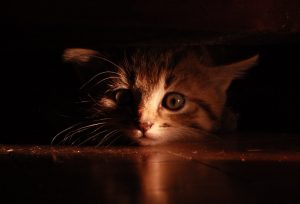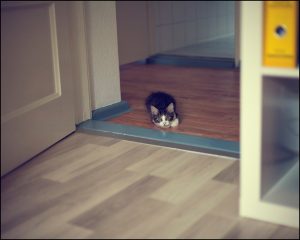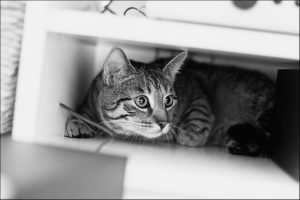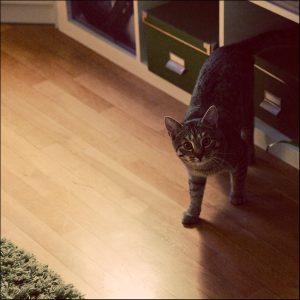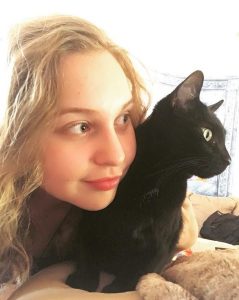Like humans, when cats experience anxiety, it can range from being as serious as having a panic attack or as minor as simple nervousness. Anxiety affects humans on a greater level than what we may be aware of; the same goes for your cat. Let’s address what anxiety is: some believe that it is only a feeling (such as worry, apprehension, fearfulness, perturbation, angst, or tension) that can come and go. In reality, anxiety is a mental health disorder. Despite how some may challenge this idea, it’s a fact. And it’s extremely common, with more than three million cases in the United States per year. As explained above, it is a disorder which is characterized by stress, fear, and worry that is strong enough to interrupt with daily activities. These same feelings can show in your cat and it will affect their ability to live life to their fullest.
Detecting Anxiety
The trick about anxiety is that it is not always easy to find the cause of it. It’s hard enough to diagnose in humans, so trying to diagnose it with our pets can be a challenge for veterinarians and behavior specialists. Anxiety can be caused by extremes such as physical and verbal abuse, or by seemingly small things like moving to a new home, separation from their humans, or another addition to the household. A tool that pet owners can use to detect the cause of anxiety is the called the HISS test.
Your cat’s Health is the first thing to look at: emotional, physical, and mental. Your cat may be exhibiting anxious behavior when they aren’t feeling well, but this anxious behavior may not be easy to recognize because cats express their anxiousness through seemingly normal behavior. Grooming, urination, attempting to defecate, and meowing are all normal behaviors, but if your cat is suffering from anxiety, these behaviors will be excessive.
Your cat’s Instincts are almost always present. The term “curiosity killed the cat” makes much more sense now because cat breeds were literally picked with selective breeding to pass on something that has been named the “caution gene”.
Stress. I cannot emphasize enough how important it is to realize how stress affects our lives, and it plagues our cat’s ability to live happily because it’s one of the many causes of anxiety. Your cat’s personality will be the main factor of how they deal with stress, but some of the triggers that can affect your cat can include their living conditions, if they have to compete with other cats for affection and love, the changing of climates (especially if you happen to live in the northern hemisphere), and if your cat feels like they have their resources needed to survive like food, water, and a clean cat box.
And lastly look for your cat’s Symptoms in order to recognize signs and solutions that can be made. Watch for hiding, because a happy confident cat will find solace in high spots such as cat trees and book shelves. But a cat that is suffering from anxiety will hide very close to the ground like under beds, inside boxes, behind furniture, and inside closets. Anxious cats will urinate and sometimes defecate outside of their cat boxes, even if it happens to be completely clean. And if your cat starts meowing more often, if it becomes louder, or if they begin crying during odd hours, they are probably signaling to you that they are feeling anxious.
Types of Anxiety
Separation Anxiety is when your cat becomes agitated, stressed, or fearful when they feel like they will be torn from or left by their humans. Again, each cat has an individual personality which makes them more or less responsive to anxiety. For instance our oldest cat, Missues, has the worst separation anxiety out of our three cats. My parents gave her to me when I was eight-years-old and, on every family vacation, she would be our traveling kitty companion. Although most cats don’t do well when they travel, Missues was a champ and she enjoyed the car rides with the windows down while she sat on a pile of blankets smelling the different scents that filled the car. But as she and I both got older, we stopped taking her on trips. I moved out of my parent’s house and took her with me to our new home, but I didn’t take her on trips with me. Unfortunately, this resulted in very bad anxiety for her.
During a month long road trip from New Mexico to New Hampshire, our cat sitter watched Missues, Mr. Baby Kitty, and Fredrick Douglass. However, when we got home, we found that Missues seemed to not have moved from our bed much. She probably missed us and found comfort in our scent coming from the pillows, but we noticed the strong scent of urine. After we bathed her and removed the sheets, we found a deep yellow stain on the mattress that seemed to have spread a bit but was very concentrated. We believe Missues urinated on herself due to the anxiety of us being gone for so long.
Her most recent anxiety attack happened after she peed on my backpack. My husband placed her in the bathroom to sleep in overnight so she wouldn’t cause any more trouble. Shortly after he put her in the bathroom, I entered to clean her up but found her puking on the floor. The next morning, there was more vomit from her dinner the night before. Our cats, especially those who are VERY close to us, will more than likely become extremely anxious when left alone for either long or short periods of time.
Phobias, however, are when a cat’s anxiety is triggered by something very specific. This is advanced trauma triggers symptoms that look a lot like PTSD in humans. Phobias are excessive and persistent fear of a negative stimulus. Once a traumatizing event has been experienced, anything familiar to it or the memory of it can generate a response. Some examples can be fireworks setting off, owners yelling or hitting their cats, or being attacked by another cat or larger animal.
What You Can Do To Help
If your cat is going into an anxiety attack and has severe trauma, follow these steps:
- Slowly get close to the ground, approach your cat gently and make yourself look less aggressive. Hopefully, your cat will be willing to come to you.
- Pet your cat softly, letting your cat smell you first, and keep the tone of your voice soothing. Do not pick up your cat.
- Watch for your cat’s responses to external stimuli to identify what may cause any more anxious behavior.
- Repeat these steps the next time your cat has an episode.
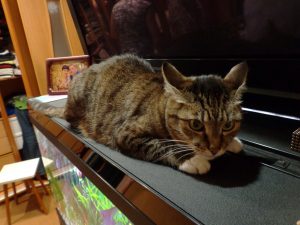
Knowing how to soothe your cat correctly can help you make monumental strides forward in the long run.
You can help your cat by talking with your veterinarian to rule out medical complications. If your cat doesn’t do well with being separated from you, prepare your cat with small absences of your time and affection. Even if you are home with them, this space will help them become more comfortable with your silence and separation. Keep your arrivals and departures very low-key and relaxed as to keep them calm as well. Keep safe toys out for your cat to play with, especially while you are not home.
Find a committed, kind and sympathetic cat sitter; your cat sitter should engage in feeding, petting, and playing with your cat twice a day, and some sitters will even stay the nights with your cat to provide more regular interaction while you’re on a trip. Use catnip to help your cat de-stress and relax. The herb valerian will also help your cat relax, but too much of it will make your cat sleepy so it is important not to expose your cat to too much. Other scents you can use for your cat’s relaxation and reduce stress are chamomile, Bach’s Rescue Remedy, and hops.
Elanda-Isabella Atencio, our Feline Editor, is on her road to being a “crazy” cat lady. She has three cats; a moody Missus, a wild Baby Kitty, and notorious Fredrick Douglass. She was raised with cats, chickens, dogs, and geese. From cleaning coops, morning dog runs, picking eggs, to growing catnip, Elanda enjoys pampering her pets. Elanda is a student at New Mexico State University, earning her BA in Creative Writing and is Editor-in-Chief of the online arts journal, Independent Noise and reader for Puerto del Sol. She plans to move to Oregon, where she hopes to take her cats on daily walks when it’s overcast and cool. If you’d like to contact Elanda, email her at eincatencio@gmail.com.

